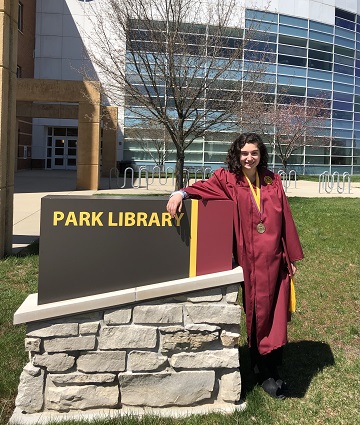
Start up

Passion. Potential. Pitches. Don't miss any of the 2025 New Venture Challenge excitement.
Tune in Friday, April 11 at 1 p.m. for great ideas and fierce competition. Then, join the judges, mentors, spectators and teams as they see who is going home with thousands of dollars in venture financing. The awards broadcast begins at 6:30 p.m. and one team will walk away as the overall best venture.
Central Michigan University’s College of Business Administration is the home of the Isabella Bank Institute for Entrepreneurship and the first Department of Entrepreneurship in the state of Michigan. We are a student-centric hub where experiential, curricular, and external entrepreneurial opportunities intersect.
Our mission is to maximize student success by fostering a campus-wide entrepreneurial mindset that promotes inter-disciplinary collaboration and the creation of new ventures.
We aim to create innovative programming, boost cross-campus and ecosystem collaboration and provide a comprehensive mentoring program.
Our institute provides extracurricular opportunities and is open to all undergraduate and graduate CMU students.
Are you interested in becoming an entrepreneur?
Every journey is unique. Explore the opportunities that interest you.
 Jason E. Taylor, Professor of Economics, is working on a paper with 2022 graduate, Nicole Polemitis. The project came to fruition when Polemitis was writing a paper for Taylor’s class. Taylor says, “[The] paper was amongst the most outstanding work I have seen from an undergraduate economics student in my 19 years at CMU.” This inspired Taylor to ask Polemitis whether she would consider allowing him to join the paper as a coauthor whereby he would add to the paper and attempt to steer it over the finish line toward scholarly publication.
Jason E. Taylor, Professor of Economics, is working on a paper with 2022 graduate, Nicole Polemitis. The project came to fruition when Polemitis was writing a paper for Taylor’s class. Taylor says, “[The] paper was amongst the most outstanding work I have seen from an undergraduate economics student in my 19 years at CMU.” This inspired Taylor to ask Polemitis whether she would consider allowing him to join the paper as a coauthor whereby he would add to the paper and attempt to steer it over the finish line toward scholarly publication.
The paper, “Has the Recent Surge in Biosimilar Competition Impacted Biologic Prices?”, explores the economic relationship between biologics and their “generic” counterparts known as biosimilars. Biologics, such as vaccines, gene therapy, and recombinant therapeutic proteins, are commonly used to treat autoimmune diseases and cancer. Today they are among the fastest growing and expensive products in the pharmaceutical industry.
While biosimilars could bring substantial cost savings to patients, prior to the Food and Drug Administration (FDA) establishing the 2018 Biosimilar Action Plan to speed along the approval process, very few biosimilars had been approved. The plan has succeeded as the FDA has now approved 35 biosimilars associated with 12 biologic competitors. Taylor and Polemitis’s paper “explores whether the recent increase in the number of ‘generic’ biosimilars has had any effect on the price of biologics and the number of times prescribed the biologics have been prescribed.”
The results of their research suggest that biosimilar competition has decreased biologic prices. Specifically, Taylor and Polemitis found that “every additional biosimilar is associated with a 1.5 to 2.1 percent reduction in the annual growth rate of the price of biologic that it may substitute for.”
Since graduating, Polemitis is currently working as a Registered Behavior Technician for kids with intellectual and developmental disabilities in Colorado and is planning to apply to medical school to becoming a developmental or neurodevelopmental pediatrician.
This story is brought to you by the Office of Research and Graduate Studies.